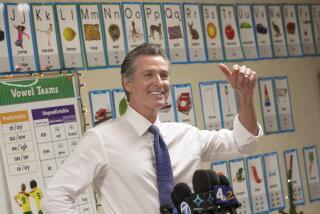‘Good Old Days’ Weren’t So, Says Shirley Hufstedler : Ex-Cabinet Officer Chides Views on Education
- Share via
Critics of the nation’s teachers who pine for “the good old days of education” are awash in erroneous nostalgia and short on historical facts, former U.S. Education Secretary Shirley Hufstedler told a national convention Friday at UC Irvine.
“There’s been a lot said about the ‘rising tide of mediocrity’ in the schools,” Hufstedler said. “I have come to realize that the ‘rising tide’ is not mediocrity in the schools; it’s mediocrity in the perception of what is going on in our schools.
“I can’t tell you how many times I’ve heard people give me that saw about how wonderful it was in the good old days, when every teacher in that little red schoolhouse taught every student the basic skills and never thought about a pay raise. Now, let’s look at the realities.
“After all, we in America are great about nostalgia, but we don’t like history a bit. The reality was that in 1940, fewer than 21% of our population who were adults had ever been to high school. The idea of having a great deal of public concern about high school dropouts was (not an issue in those days). Too few students got a chance to drop in. In rural and semi-rural America, the average achievement in formal education was the eighth grade.”
Advances After War
Hufstedler said that the great advances in American education came after World War II, when more Americans advanced not only into high schools, but also into colleges and universities.
She said that American teachers since World War II have thus had to cope with dramatic increases in numbers of students, as well as complex issues. In recent years, she said, educators have had the added burden of trying to educate increased waves of immigrants, “people who formerly got no education at all.”
Despite teachers’ record of achievement during the past 40 years of upwardly mobile education in America, Hufstedler said, the profession still is badly treated. “The assumption is still out there that you’re worth what you’re paid.
“I have discovered that those who are the most critical of what’s going on in our schools haven’t set foot in one in at least a decade,” she added.
Education Society Meeting
Hufstedler spoke to the national meeting of Pi Lambda Theta, an education honorary society whose 260 conventioneers have been meeting at UCI since Wednesday. The convention concludes today.
Hufstedler, who was a federal appeals court judge before being tapped by President Jimmy Carter to be the nation’s first U.S. secretary of education, is now an attorney in Los Angeles.
Her extemporaneous speech to the educators was frequently interrupted by applause.
In addition to defending teachers, Hufstedler’s speech was critical of what has happened to aid to education under the Reagan Administration. She said that every federal aid-to-education program, without exception, had been cut in recent years.
“All the cuts are because of our national priority that it’s more important to build weaponry than it is to build kids,” she said. “(But) if we haven’t got our children educated, what (sense) does it make to have sophisticated weapons?”
Hufstedler also questioned the Reagan Administration’s support of proposed aid to private and parochial schools. She said she supports private and parochial schools and thinks they are part of the diversity that makes up educational strength in the nation.
“But if you give public aid to private education, they aren’t private schools any more. They are public,” she said.
More to Read
Sign up for Essential California
The most important California stories and recommendations in your inbox every morning.
You may occasionally receive promotional content from the Los Angeles Times.













